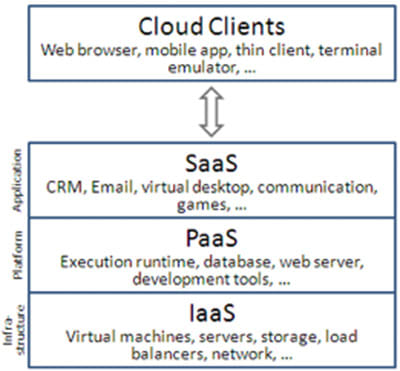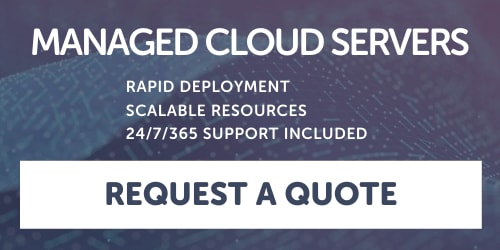
History
Once upon a time before public cloud, each Internet service was hosted on the servers of its provider. For example, a University would have a room full of servers dedicated to providing computing power and data storage to its lecturers and students. Over time, some of this hosting model was outsourced to third-party companies (ISPs) which could focus on managing the servers (hardware) while the service provider (you) would rent that hardware and deploy their Internet services (software) there.
In recent years, cloud computing emerged as the next evolution of this paradigm: the hardware was paired with managed software that made it a lot easier to develop powerful Internet services.
The public cloud was born.
What Is A Public Cloud?
The public cloud is composed of pay-per-usage cloud computing services offered publicly over the Internet.
Cloud computing started off as public-only: all its services were available for public use. Any organization could sign up to use it. Then, “private” cloud was introduced with the goal of operating a set of cloud infrastructure exclusively for one organization.
It is also possible to compose a public cloud with a private environment to obtain a hybrid cloud. Although this approach is more complex, it can be necessary in order to take advantage of the benefits of both environments. Typically, they are connected through a dedicated VPN.
Services Offered

The Public Cloud is typically composed of services that can be divided into three layers:
Infrastructure as a Service (IaaS)
Instead of buying a server yourself, you can rent server space or other hardware services such as virtual machines, data storage, networking hardware, and bandwidth with IaaS. Typically, you can just use your web browser to order and manage the servers that you need.
In addition, the infrastructure is scalable. This means you can increase or lower the number of servers that you use based on your needs. This is a very powerful benefit, because you don’t have to commit a lot of money on hardware that might end up being too big (which is wasteful), or too small (which is not enough to handle your peak loads).
Platform as a Service (PaaS)
When you are developing your software, you can increase your productivity by taking advantage of ready-to-use, fully managed business intelligence (BI) services, database management systems, and other PaaS services.
These PaaS services are easy to use and powerful. This means instead of spending a lot of time installing and configuring a local database system, you can use a cloud database system that is managed, scalable, and secure. And since they are built for other users, they typically come with very detailed documentation.
You also get access to services that are simply not available anywhere else. For example, some public cloud providers offer advanced services that can handle petabytes of data in real-time.
Software as a Service (SaaS)
Just as music and movies are increasingly available through streaming services, so are commercial software. Instead of manually installing software on their own computer, users access it via the Internet. The software provider usually hosts the software, making it a public cloud service. Typically, payment is done by subscription. With this model, you will always have the latest version along with ongoing IT support.
How Does Public Cloud Compare With Cloud VPS and Dedicated Cloud Hosting?
It is important to recognize that not all public cloud options look (and act) the same for each use case. Many businesses and organizations choose to not utilize a large public cloud provider like AWS or Microsoft Azure. Whether for compliance, legal reasons, or technological preference, there are myriad reasons for choosing a different option.
As such, it is critical to understand that your business and specific use case can be filled by other cloud configurations and solutions including Cloud VPS and Cloud Dedicated Servers.
These solutions provide the power, versatility, and scalability of traditional public cloud. However, unlike a public cloud option that can be cumbersome or complicated to deploy, administer, and support, VPS and dedicated cloud hosting offer more traditional and familiar functionality without sacrificing the benefits that make the cloud so appealing.
What are the Top Features of Public Cloud?
The Public Cloud comes with five main features:
1. Scalability
You can start building and deploying your software with little to no upfront cost. There is no need to buy hardware or expensive software licenses. Public cloud offers a pay-as-you-go model that enables you to choose the services you need at the scale that you require to start.
Then, you can adjust these choices as your needs change. As your traffic grows or shrinks, you can dynamically increase or reduce the amount of IaaS services that you use. PaaS and SaaS services will scale automatically.
Similarly, shutting down your software immediately stops all ongoing costs. Although you can choose to sign a long-term contract (which typically lowers your costs), that is optional.
2. Maintenance
You don’t need to worry about maintaining public cloud services, as they will automatically be updated and improved over time. Although a public cloud can have some outages, they are usually far less common and isolated thanks to geo-redundancies and backups.
If you rely on PaaS or SaaS, the amount of software that you will need to develop yourself will be significantly lower. This will make your own operational costs much smaller. That way, you can focus on running your business instead of spending time on technical issues.
Finally, you can have access to IT support that will help you troubleshoot any issues that you may have.
3. Security
All the underlying public cloud services that you use are designed and monitored to stay as secure as possible by a team of security experts.
This means you can focus on securing your software. Just make sure to follow the best practices on how to use the public cloud services. For example, they are often accessible programmatically with an API key. So, you must ensure that you keep that API key private.
4. Worldwide Access
The public cloud is accessible from anywhere. Not only can you deploy and manage your software using just a web browser, you can also make that software available to your customers around the world.
For example, your customers in Europe can be connected to your software running on a server that is also located in Europe. This makes connectivity faster and more reliable.
5. Innovation
Public cloud providers have teams dedicated to working on their services. This is core to their business model. This means they will spend a lot of resources building and improving these services. This is a level of investment that leads to highly sophisticated and powerful services.
Then, thanks to the economy of scale, you can use these services at a very affordable price.
Using the Public Cloud
Businesses and individuals are increasingly turning to cloud computing for their IT services. The public cloud allows a wide audience to access data and services anytime, anywhere, however, they want. This reduces your own hardware and software acquisition and maintenance costs. It also provides services that you could not develop yourself, all at a flexible pay-as-you-go cost.
Try Cloud Servers
Cloud Servers are a turnkey, scalable public cloud solution with rapid deployment, predictable monthly billing, and 24/7/365 fully managed support.
[ad_2]
Source link







